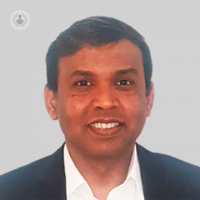Dry and wet AMD: what are my treatment options?
Written by:Age-related macular degeneration is a serious condition that needs immediate medical attention. In his latest online article, highly-experienced consultant ophthalmologist Mr Balasubramanian Ramasamy explains the symptoms and treatment options of this condition.

What are the first signs of macular degeneration?
Macular degeneration is predominantly an age-related process which affects the central vision of patients. Common symptoms reported by patients are blurring or distortion of central vision. This could be straight lines appearing bendy or wavy, or even a sudden decrease in the central vision. Any of these should alert the patients to seek urgent medical attention. Potentially, this could be a wet type of macular degeneration.
Are both eyes always affected?
Most of the time, macular degeneration is a systemic problem and a degenerative issue where the retinal layers' energy levels are decreased because of the oxidative stress that has been accumulating over many years. This can be due to various risk factors, such as smoking, family history, genetics, and exposure to heavy sunlight. All of these factors can affect the energy levels in the retinal layers, causing a degenerative change.
You would expect macular degeneration to affect both eyes, but it's interesting to note that it could be asymmetrical. In some cases, one eye could be worse than the other. Very rarely, we find patients in a slightly younger category where they develop a subtype of macular degeneration that only affects one eye and not the other. However, it's essential to monitor patients regularly and consider the time scales involved.
What is the difference between wet AMD and dry AMD?
Now, let's visualise macular degeneration as a process of decreased energy levels in the retina, leading to the accumulation of debris. Dry macular degeneration serves as the starting point of this entire process and gradually affects central vision over many years.
On the other hand, wet macular degeneration is not a distinctly separate entity; rather, it supervenes on a background of dry macular degeneration. It occurs when new blood vessels cause bleeding or fluid leakage, hence the term "wet," referring to the presence of blood or fluid affecting the central retina. In essence, it's an addition to the existing dry macular degeneration.
Wet macular degeneration requires active treatment because it can potentially accelerate and increase the risk of rapid visual loss. In contrast, dry macular degeneration entails a very slow and steady decline, resembling an ageing change at its core. Wet macular degeneration, on the other hand, acts as a sudden event that accelerates the ageing process more rapidly and necessitates active treatment.

What are the most common treatment options for dry and wet AMD?
For the dry type, there are emerging treatments, such as photobiomodulation, which we offer, and ongoing research on new medications that can be delivered via intravitreal injections into the eye, expected to be available in the near future. These are exciting advancements, but it's important to note that as of now, there is no definitive cure to reverse dry macular degeneration.
Dry macular degeneration is inherently linked with ageing. Therefore, unless we find a way to reverse the ageing process, a cure for dry macular degeneration remains elusive. Nonetheless, treatments like photobiomodulation, a light therapy aimed at reducing oxidative damage to the retinal cells, can effectively slow down the progression of dry macular degeneration.
On the other hand, wet macular degeneration used to be the more severe of the two types, until about 20 years ago when the introduction of anti-vascular endothelial growth factor or anti-VEGF injections revolutionised its management.
These injections can be administered quickly in a clinical setting and have been a game-changer, stabilising central vision affected by wet macular degeneration for many years. With these treatments, wet macular degeneration can be controlled and optimised, allowing us to mitigate its impact and slow its progression, thus preserving central vision for an extended period.
How successful and safe are these treatments?
This condition has always presented challenges, and it's crucial to understand that the available treatments are not a cure. I make sure to explain this to all my patients with macular degeneration, emphasising that finding a cure for ageing is essential to reverse and completely cure macular degeneration. The condition is inherently tied to the ageing process, making it difficult to promise a definitive cure for age-related cases. However, there are exceptions, particularly with young patients who develop macular degeneration; in these cases, we can effectively stall the progression and maintain central vision.
Despite the lack of a cure, the treatments we have at our disposal are remarkably effective in extending the preservation of useful central vision for many years. For instance, consider a patient aged 70 or 80 years; if we can provide them with 15 to 20 years of useful central vision through these injections, it is truly remarkable. These treatments significantly decrease the rate of progression of the condition, ensuring the retention of useful central vision.
In summary, while curing age-related macular degeneration remains a challenge, these treatments are undeniably powerful tools in buying valuable time and maintaining useful central vision for an extended period. They represent a substantial step forward in managing the condition and improving patients' quality of life.
Mr Balasubramanian Ramasamy is a renowned consultant ophthalmologist based in Wirral. If you would like to book a consultation with Mr Ramasamy you can do so today via his Top Doctors profile.


